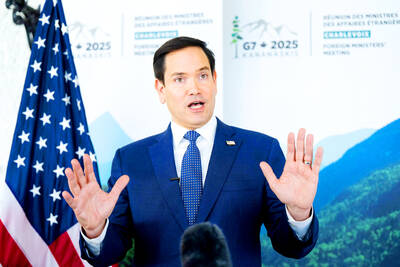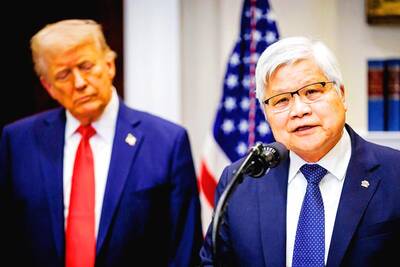The national defense budget over the past two years averaged 1.84 percent of GDP, falling short of President Tsai Ing-wen’s (蔡英文) campaign pledge to increase military spending to 3 percent of GDP, the Ministry of National Defense said in its latest report to the Legislative Yuan.
The national defense budget this year was NT$327.8 billion (US$10.73 billion), and NT$153.9 billion of it, or about 46.96 percent, was allocated to personnel expenditures, according to the report.
The average defense spending over the past two years represents a decline from 2.54 percent of GDP in 2008, the report said.
Had Tsai’s campaign promise been fulfilled, the defense budget would be NT$535 billion this year, a senior defense official said on condition of anonymity.
Barring additional large-scale procurement of foreign arms, military spending is unlikely to reach 3 percent of GDP before the end of Tsai’s four-year term, the official said.
Even if the government raised defense spending by 2 or 3 percentage points annually from its current level as Tsai has proposed, the goal would still be out of reach, the official said.
The military had hoped to increase the defense budget to NT$360 billion in fiscal year 2019, or 2 percent of GDP, but the Executive Yuan said that it could not meet that expectation in light of unexpected revenue shortfalls, the official said.
Nevertheless, the Executive Yuan and the legislature have expressed support for including as priorities in next year’s defense budget M1A2 Abrams main battle tanks, an indigenous fast attack missile boat program and a new mobile surface-to-air missile system, the official said.
The weapons systems are crucial to bolstering morale and improving the military’s combat capabilities, the official said.
When allocating funds, the ministry prioritizes meeting the armed forces’ legal obligations to military personnel, and the maintenance of current investments and existing operational needs before tackling new projects, the report said.
The estimated cost of military personnel expenditures was NT$141.5 billion in 2015, NT$145.7 billion in 2016 and NT$141.7 billion last year, it said.
In accordance with legal obligations, the ministry almost always spends as much money on personnel expenditure-related items as the listed amount, with spending for those items exceeding 99.5 percent of projected costs every year, the report said.

Taiwan’s Lee Chia-hao (李佳豪) on Sunday won a silver medal at the All England Open Badminton Championships in Birmingham, England, a career best. Lee, 25, took silver in the final of the men’s singles against world No. 1 Shi Yuqi (石宇奇) of China, who won 21-17, 21-19 in a tough match that lasted 51 minutes. After the match, the Taiwanese player, who ranks No. 22 in the world, said it felt unreal to be challenging an opponent of Shi’s caliber. “I had to be in peak form, and constantly switch my rhythm and tactics in order to score points effectively,” he said. Lee got

‘CROWN JEWEL’: Washington ‘can delay and deter’ Chinese President Xi Jinping’s plans for Taiwan, but it is ‘a very delicate situation there,’ the secretary of state said US President Donald Trump is opposed to any change to Taiwan’s “status quo” by force or extortion and would maintain that policy, US Secretary of State Marco Rubio told the Hugh Hewitt Show host on Wednesday. The US’ policy is to maintain Taiwan’s “status quo” and to oppose any changes in the situation by force or extortion, Rubio said. Hewitt asked Rubio about the significance of Trump earlier this month speaking with Taiwan Semiconductor Manufacturing Co (台積電) chairman C.C. Wei (魏哲家) at the White House, a meeting that Hewitt described as a “big deal.” Asked whether the meeting was an indication of the

‘RELATIVELY STRONG LANGUAGE’: An expert said the state department has not softened its language on China and was ‘probably a little more Taiwan supportive’ China’s latest drills near Taiwan on Monday were “brazen and irresponsible threats,” a US Department of State spokesperson said on Tuesday, while reiterating Washington’s decades-long support of Taipei. “China cannot credibly claim to be a ‘force for stability in a turbulent world’ while issuing brazen and irresponsible threats toward Taiwan,” the unnamed spokesperson said in an e-mailed response to media queries. Washington’s enduring commitment to Taiwan will continue as it has for 45 years and the US “will continue to support Taiwan in the face of China’s military, economic, informational and diplomatic pressure campaign,” the e-mail said. “Alongside our international partners, we firmly

KAOHSIUNG CEREMONY: The contract chipmaker is planning to build 5 fabs in the southern city to gradually expand its 2-nanometer chip capacity Taiwan Semiconductor Manufacturing Co (TSMC, 台積電), the world’s biggest contract chipmaker, yesterday confirmed that it plans to hold a ceremony on March 31 to unveil a capacity expansion plan for its most advanced 2-nanometer chips in Kaohsiung, demonstrating its commitment to further investment at home. The ceremony is to be hosted by TSMC cochief operating officer Y.P. Chyn (秦永沛). It did not disclose whether Premier Cho Jung-tai (卓榮泰) and high-ranking government officials would attend the ceremony. More details are to be released next week, it said. The chipmaker’s latest move came after its announcement earlier this month of an additional US$100 billion